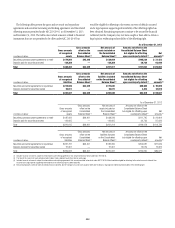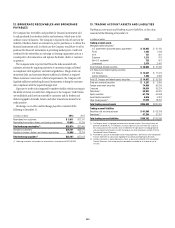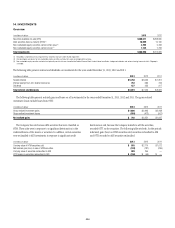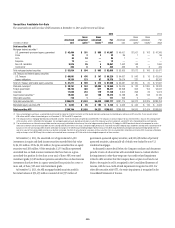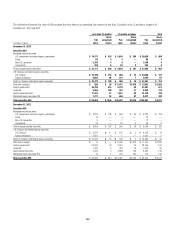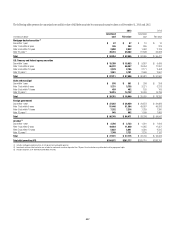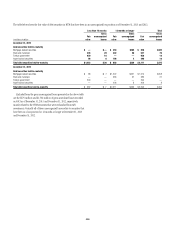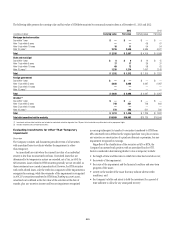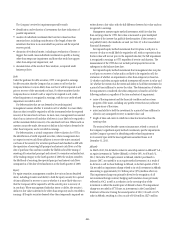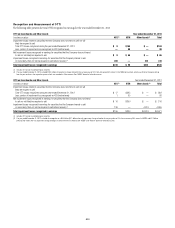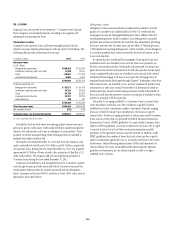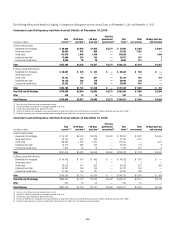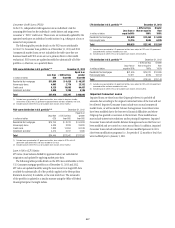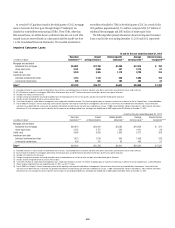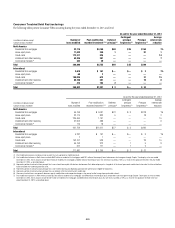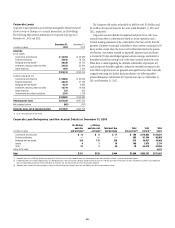Citibank 2013 Annual Report Download - page 230
Download and view the complete annual report
Please find page 230 of the 2013 Citibank annual report below. You can navigate through the pages in the report by either clicking on the pages listed below, or by using the keyword search tool below to find specific information within the annual report.212
after-tax) recorded in Other revenue. As of December 31, 2013, the
remaining 9.9% stake in Akbank is recorded within marketable equity
securities available-for-sale. The revaluation of the Turkish Lira was
hedged, so the change in the value of the currency related to Akbank
investment did not have a significant impact on earnings during
the year.
MSSB
On September 17, 2012, Citi sold to Morgan Stanley a 14% interest (the 14%
Interest) in the MSSB joint venture, pursuant to the exercise of the purchase
option by Morgan Stanley on June 1, 2012. Morgan Stanley paid Citi
$1.89 billion in cash as the purchase price of the 14% Interest. The purchase
price was based on an implied 100% valuation of the MSSB joint venture
of $13.5 billion, as agreed between Morgan Stanley and Citi pursuant to an
agreement dated September 11, 2012. The related approximately $4.5 billion
in deposits were transferred to Morgan Stanley at no premium, as agreed
between the parties.
Prior to the September 2012 sale, Citi’s carrying value of its 49% interest
in the MSSB joint venture was approximately $11.3 billion. As a result
of the agreement entered into with Morgan Stanley on September 11,
2012, Citi recorded a charge to net income in the third quarter of 2012 of
approximately $2.9 billion after-tax ($4.7 billion pretax), consisting of
(i) a charge recorded in Other revenue of approximately $800 million
after-tax ($1.3 billion pretax), representing a loss on sale of the 14%
Interest, and (ii) an OTTI of the carrying value of its then-remaining 35%
interest in the MSSB joint venture of approximately $2.1 billion after-tax
($3.4 billion pretax).
On June 21, 2013, Morgan Stanley notified Citi of its intent to exercise
its call option with respect to Citi’s remaining 35% investment in the MSSB
joint venture, composed of an approximate $4.725 billion equity investment
and $3 billion of other MSSB financing (consisting of approximately
$2.028 billion of preferred stock and a $0.880 billion loan). At the closing
of the transaction on June 28, 2013, the loan to MSSB was repaid and the
MSSB interests and preferred stock were settled, with no significant gains or
losses recorded at the time of settlement. In addition, MSSB made a dividend
payment to Citi on June 28, 2013 in the amount of $37.5 million.
Mortgage-backed securities
For U.S. mortgage-backed securities (and in particular for Alt-A and other
mortgage-backed securities that have significant unrealized losses as a
percentage of amortized cost), credit impairment is assessed using a cash
flow model that estimates the cash flows on the underlying mortgages, using
the security-specific collateral and transaction structure. The model estimates
cash flows from the underlying mortgage loans and distributes those cash
flows to various tranches of securities, considering the transaction structure
and any subordination and credit enhancements that exist in that structure.
The cash flow model incorporates actual cash flows on the mortgage-backed
securities through the current period and then projects the remaining cash
flows using a number of assumptions, including default rates, prepayment
rates, recovery rates (on foreclosed properties) and loss severity rates
(on non-agency mortgage-backed securities).
Management develops specific assumptions using as much market data
as possible and includes internal estimates, as well as estimates published
by rating agencies and other third-party sources. Default rates are projected
by considering current underlying mortgage loan performance, generally
assuming the default of (i) 10% of current loans, (ii) 25% of 30-59 day
delinquent loans, (iii) 70% of 60-90 day delinquent loans and (iv) 100%
of 91+ day delinquent loans. These estimates are extrapolated along a
default timing curve to estimate the total lifetime pool default rate. Other
assumptions contemplate the actual collateral attributes, including
geographic concentrations, rating actions and current market prices.
Cash flow projections are developed using different stress test scenarios.
Management evaluates the results of those stress tests (including the
severity of any cash shortfall indicated and the likelihood of the stress
scenarios actually occurring based on the underlying pool’s characteristics
and performance) to assess whether management expects to recover the
amortized cost basis of the security. If cash flow projections indicate that the
Company does not expect to recover its amortized cost basis, the Company
recognizes the estimated credit loss in earnings.
State and municipal securities
The process for identifying credit impairments in Citigroup’s AFS state and
municipal bonds is primarily based on a credit analysis that incorporates
third-party credit ratings. Citigroup monitors the bond issuers and any
insurers providing default protection in the form of financial guarantee
insurance. The average external credit rating, ignoring any insurance, is
Aa3/AA-. In the event of an external rating downgrade or other indicator of
credit impairment (i.e., based on instrument-specific estimates of cash flows
or probability of issuer default), the subject bond is specifically reviewed for
adverse changes in the amount or timing of expected contractual principal
and interest.
For AFS state and municipal bonds with unrealized losses that Citigroup
plans to sell, would likely be required to sell or will be subject to an issuer call
deemed probable of exercise prior to the expected recovery of its amortized
cost basis, the full impairment is recognized in earnings.


